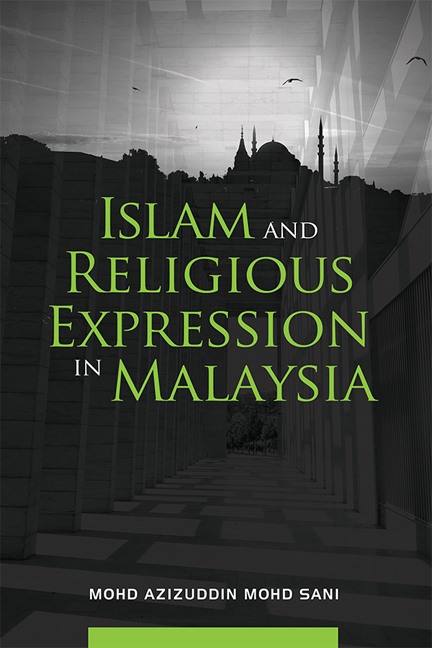Book contents
- Frontmatter
- Cantents
- Foreword
- Preface
- Acknowledgements
- List of Acronyms and Abbreviations
- 1 Freedom of Expression
- 2 Islamization Policy and Islamic Bureaucracy
- 3 Inter-Religious Expression
- 4 Intra-Religious Expression
- 5 Extreme Expression and Radicalization
- 6 New Malaysia under Pakatan Harapan
- 7 Conclusion: Seeking for a Genuine Freedom of Religious Expression
- Bibliography
- Index
- About the Author
- Frontmatter
- Cantents
- Foreword
- Preface
- Acknowledgements
- List of Acronyms and Abbreviations
- 1 Freedom of Expression
- 2 Islamization Policy and Islamic Bureaucracy
- 3 Inter-Religious Expression
- 4 Intra-Religious Expression
- 5 Extreme Expression and Radicalization
- 6 New Malaysia under Pakatan Harapan
- 7 Conclusion: Seeking for a Genuine Freedom of Religious Expression
- Bibliography
- Index
- About the Author
Summary
Islamic religious expression takes various forms globally from peaceful piety-oriented ones to the most brutal and violent ones.
The September 11 attack in New York has come to be viewed as the most violent public Islamic religious expression that led to the development of intense Islamophobia globally. It was subsequently made more intense by continuous Islamic jihadist attacks conducted in various parts of the world, from the United Kingdom to Chechnya, from Bali to Colombo. When videos of the beheadings of innocent individuals by the Islamic State and the Levant (ISIL) of the Middle East were shown on the Internet, the whole world was shocked and bewildered as to how much more violent Islam could become. Not surprisingly, thereafter, hatred towards Islam came to be generalized and embedded in the negative perceptions and narratives of billions throughout the world.
The majority of Muslims themselves could not provide any explanation or rationale to these abhorrence violent religious expressions. They could not give any credible reason and even if they could, most of them sounded weak and defensive, even evasive.
When President Barrack Obama delivered his speech in Cairo on 4 June 2009 on “the new beginning between the United States and Muslims around the world, one based on mutual interest and mutual respect … by expanding partnerships in areas like education, economic development, science and technology, and health …”, the world paused for a moment, with some segments of the Muslim and non-Muslim populace offering euphoric responses.
When Obama addressed the issue of economic development and opportunity, he emphasized how human progress cannot be denied, in spite of the crisis faced by the world, including among Muslim communities across the globe. He then specifically referred to “the astonishing progress within Muslim-majority countries from Kuala Lumpur to Dubai” based on innovation and modernization whilst enjoying peace, prosperity, progress, and political stability.
It could be argued that the gist of Obama's speech is that Islamic religious expression throughout history has been intellectually positive. He stressed on the peaceful manner of the expression that benefitted human civilization. Peaceful Islamic religious expression has continuously dominated the history of Islam that, in turn, has enabled it to contribute to world civilizations in the longue durée term.
- Type
- Chapter
- Information
- Islam and Religious Expression in Malaysia , pp. viii - xPublisher: ISEAS–Yusof Ishak InstitutePrint publication year: 2020

